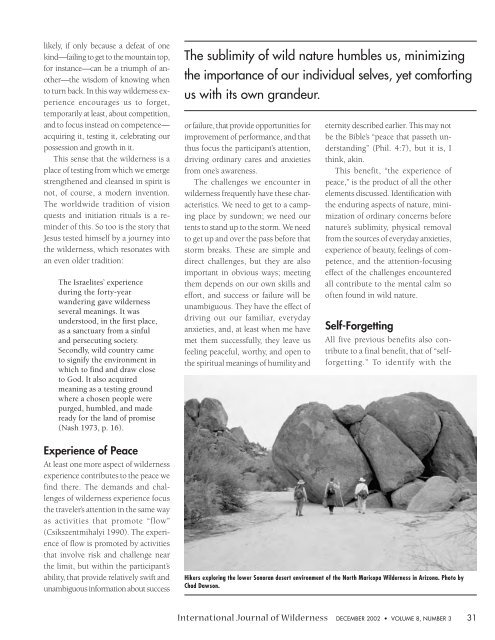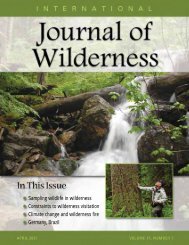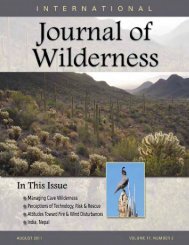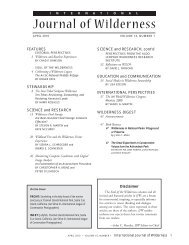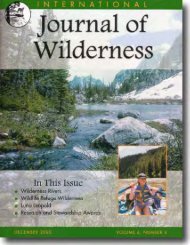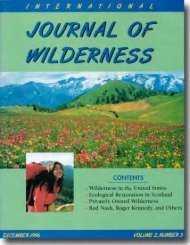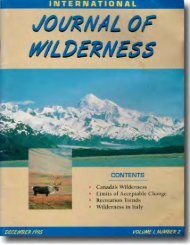Download full PDF - International Journal of Wilderness
Download full PDF - International Journal of Wilderness
Download full PDF - International Journal of Wilderness
You also want an ePaper? Increase the reach of your titles
YUMPU automatically turns print PDFs into web optimized ePapers that Google loves.
likely, if only because a defeat <strong>of</strong> one<br />
kind—failing to get to the mountain top,<br />
for instance—can be a triumph <strong>of</strong> another—the<br />
wisdom <strong>of</strong> knowing when<br />
to turn back. In this way wilderness experience<br />
encourages us to forget,<br />
temporarily at least, about competition,<br />
and to focus instead on competence—<br />
acquiring it, testing it, celebrating our<br />
possession and growth in it.<br />
This sense that the wilderness is a<br />
place <strong>of</strong> testing from which we emerge<br />
strengthened and cleansed in spirit is<br />
not, <strong>of</strong> course, a modern invention.<br />
The worldwide tradition <strong>of</strong> vision<br />
quests and initiation rituals is a reminder<br />
<strong>of</strong> this. So too is the story that<br />
Jesus tested himself by a journey into<br />
the wilderness, which resonates with<br />
an even older tradition:<br />
The Israelites’ experience<br />
during the forty-year<br />
wandering gave wilderness<br />
several meanings. It was<br />
understood, in the first place,<br />
as a sanctuary from a sinful<br />
and persecuting society.<br />
Secondly, wild country came<br />
to signify the environment in<br />
which to find and draw close<br />
to God. It also acquired<br />
meaning as a testing ground<br />
where a chosen people were<br />
purged, humbled, and made<br />
ready for the land <strong>of</strong> promise<br />
(Nash 1973, p. 16).<br />
Experience <strong>of</strong> Peace<br />
At least one more aspect <strong>of</strong> wilderness<br />
experience contributes to the peace we<br />
find there. The demands and challenges<br />
<strong>of</strong> wilderness experience focus<br />
the traveler’s attention in the same way<br />
as activities that promote “flow”<br />
(Csikszentmihalyi 1990). The experience<br />
<strong>of</strong> flow is promoted by activities<br />
that involve risk and challenge near<br />
the limit, but within the participant’s<br />
ability, that provide relatively swift and<br />
unambiguous information about success<br />
The sublimity <strong>of</strong> wild nature humbles us, minimizing<br />
the importance <strong>of</strong> our individual selves, yet comforting<br />
us with its own grandeur.<br />
or failure, that provide opportunities for<br />
improvement <strong>of</strong> performance, and that<br />
thus focus the participant’s attention,<br />
driving ordinary cares and anxieties<br />
from one’s awareness.<br />
The challenges we encounter in<br />
wilderness frequently have these characteristics.<br />
We need to get to a camping<br />
place by sundown; we need our<br />
tents to stand up to the storm. We need<br />
to get up and over the pass before that<br />
storm breaks. These are simple and<br />
direct challenges, but they are also<br />
important in obvious ways; meeting<br />
them depends on our own skills and<br />
effort, and success or failure will be<br />
unambiguous. They have the effect <strong>of</strong><br />
driving out our familiar, everyday<br />
anxieties, and, at least when me have<br />
met them success<strong>full</strong>y, they leave us<br />
feeling peaceful, worthy, and open to<br />
the spiritual meanings <strong>of</strong> humility and<br />
eternity described earlier. This may not<br />
be the Bible’s “peace that passeth understanding”<br />
(Phil. 4:7), but it is, I<br />
think, akin.<br />
This benefit, “the experience <strong>of</strong><br />
peace,” is the product <strong>of</strong> all the other<br />
elements discussed. Identification with<br />
the enduring aspects <strong>of</strong> nature, minimization<br />
<strong>of</strong> ordinary concerns before<br />
nature’s sublimity, physical removal<br />
from the sources <strong>of</strong> everyday anxieties,<br />
experience <strong>of</strong> beauty, feelings <strong>of</strong> competence,<br />
and the attention-focusing<br />
effect <strong>of</strong> the challenges encountered<br />
all contribute to the mental calm so<br />
<strong>of</strong>ten found in wild nature.<br />
Self-Forgetting<br />
All five previous benefits also contribute<br />
to a final benefit, that <strong>of</strong> “selfforgetting.”<br />
To identify with the<br />
Hikers exploring the lower Sonoran desert environment <strong>of</strong> the North Maricopa <strong>Wilderness</strong> in Arizona. Photo by<br />
Chad Dawson.<br />
<strong>International</strong> <strong>Journal</strong> <strong>of</strong> <strong>Wilderness</strong> DECEMBER 2002 • VOLUME 8, NUMBER 3 31


